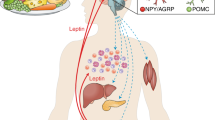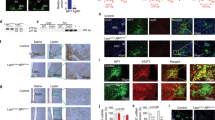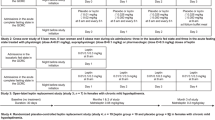Abstract
Leptin, the product of the Obese (Lep) gene, orchestrates behavioral and metabolic responses to nutrient intake. Here, we demonstrate tissue-specific autoregulation of Lep. Moderate increases in circulating leptin considerably decreased Lep expression in adipose tissue and induced lep expression in skeletal muscle, a tissue that normally does not express this gene. Changes in nutrient availability resulted in rapid alterations in Lep autoregulation. These findings demonstrate negative feedback regulation of Lep in fat, and indicate that leptin secretion can function as a vehicle of 'cross-talk' between adipose tissue and skeletal muscle, leading to tissue-specific modulation of the 'leptin signal'.
This is a preview of subscription content, access via your institution
Access options
Subscribe to this journal
Receive 12 print issues and online access
$209.00 per year
only $17.42 per issue
Buy this article
- Purchase on Springer Link
- Instant access to full article PDF
Prices may be subject to local taxes which are calculated during checkout




Similar content being viewed by others
References
Coleman, D.L. Obese and diabetes: two mutant genes causing diabetes-obesity syndromes in mice. Diabetologia 14, 141–148 (1978).
Zhang, Y. et al. Positional cloning of the mouse obese gene and its human homologue. Nature 372, 42–32 (1994).
Wang, J., Liu, R., Hawkins, M., Barzilai, N. & Rossetti, L. A nutrient sensing pathway regulates leptin gene expression in muscle and fat. Nature 393, 684–688 (1998).
Bado, A. et al. The stomach is a source of leptin. Nature 394, 790–793 (1998).
Masuzaki, H. et al. Nonadipose tissue production of leptin as a novel placenta-derived hormone in humans. Nature Med. 3, 1029–1033 (1997).
Campfield, L., Smith, F.J., Guisez, Y., Devos, R. & Burn, P. Recombinant mouse OB protein: evidence for a peripheral signal linking adiposity and central neural networks. Science 269, 546–549 (1995).
Frederich, R.C. et al. Leptin levels reflect body lipid content in mice: evidence for diet-induced resistance to leptin action. Nature Med. 1, 1311–1314 (1995).
Flier, J.S. Leptin expression and action: New experimental paradigms. Proc. Natl. Acad. Sci. USA 94, 4242–4245 (1997).
Friedman, J.M. & Halaas, J.L. Leptin and the regulation of body weight in mammals. Nature 395, 763–770 (1998).
Halaas, J.L. et al. Weight-reducing effects of the plasma protein encoded by the obese gene. Science 269, 543–546 (1995).
Schwartz, M.W., Seeley, R.J., Campfield, L.A., Burn, P. & Baskin, D.G. Identification of targets of leptin action in rat hypothalamus. J. Clin. Invest. 98, 1101–1106 (1996).
Caro, J.F., Sinha, M.K., Kolaczynski, W., Zhang, P.L. & Considine, R.V. Leptin: the tale of an obesity gene. Diabetes 45, 1455–1462 (1996).
Ravussin, E. et al. Relatively low plasma leptin concentrations precede weight gain in Pima Indians. Nature Med. 3, 238–240 (1997).
Carpenter, L.R. et al. Enhancing leptin response by preventing SH2-containing phosphatase 2 interaction with ob receptor. Proc. Natl. Acad. Sci. USA 95, 6061–6066 (1998).
Bjorbaek, C., Elmquist, J.K., Frantz, J.D., Shoelson, S.E. & Flier, J.S. Identification of SOCS-3 as a potential mediator of central leptin resistance. Mol. Cell 1, 619–625 (1998).
Boston, B.A., Blaydon, K.M., Varnerin, J. & Cone R.D. Independent and additive effects of central POMC and leptin pathways on murine obesisty. Science 278, 1641–1644 (1997).
Chua, S.C.J. et al. Phenotypes of mouse diabetes and rat fatty due to mutations in the OB (leptin) receptor. Science 271, 994–996 (1996).
Considine, R.V., Considine, E.L., Williams, C.J., Hyde, T.M. & Caro, J.F. The hypothalamic leptin receptor in humans: identification of incidental sequence polymorphisms and absence of the db/db mouse and fa/fa rat mutations. Diabetes 45, 992–994 (1996).
Jacob, R.J. et al. The effect of leptin is enhanced by microinjection into the ventromedial hypothalamus. Diabetes 46,150–152 (1997).
Bai, Y., Zhang, S., Kim, K.-S., Lee, J.-K. & Kim, K.-H. Leptin inhibits acetyl-CoA carboxylase in 3T3 pre-adipocytes. J. Biol. Chem. 271, 13939–13942 (1996).
Lord, G.M. et al. Leptin modulates the T-cell immune response and reverses starvation-induced immunosuppression. Nature 394, 897–901 (1998).
Muoio, D.M., Dohn, G.L., Fiedorek, F.T., Tapscott, E.B. & Coleman, R.A. Leptin directly alters lipid partitioning in skeletal muscle. Diabetes 46, 1360–1363 (1997).
Shimabukuro, M. et al. Direct antidiabetic effect of leptin through triglyceride depletion of tissues. Proc. Natl. Acad. Sci. USA 94, 4637–4641 (1997).
Sierra-Honigmann, M.R. et al. Biological action of leptin as an angiogenic factor. Science 281, 1683–1686 (1998).
Kellerer, M. et al. Leptin activates PI-3 kinase in C2C12 myotubes via janus kinase-2 (JAK-2) and insulin receptor substrate-2 (IRS-2) dependent pathways. Diabetologia 40, 1358–1362 (1997).
Liu, L. et al. Intracerebroventricular leptin regulates hepatic but not peripheral glucose fluxes. J. Biol. Chem. 273, 31160–31167 (1998).
Rossetti, L., Smith, D., Shulman, G.I., Papachristou, D. & DeFronzo, R.A. Corection of hyperglycemia with phlorizin normalizes tissue sensitivity to insulin in diabetic rats. J. Clin. Invest. 79, 1510–1515 (1987).
Rossetti, L. et al. Short-term effects of leptin on hepatic gluconeogenesis and in vivo insulin action. J. Biol. Chem. 27758–27763 (1997).
Tartaglia, L. et al. Identification and expression cloning of a leptin receptor, OB-R. Cell 83, 1263–1271 (1995).
Zhang, Y. et al. The leptin receptor mediates apparent autocrine regulation of leptin gene expression. Biochem. Biophys. Res. Comm. 240, 492–495 (1997).
Saladin, R. et al. Transient increase in obese gene expression after food intake or insulin administration. Nature 377, 527–529 (1995).
Gong, D.-W., He, Y., Karas, M. & Reitman, M. Uncoupling protein-3 is a mediator of thermogenesis regulated by thyroid hormone, b3-adrenergic agonists, and leptin. J. Biol. Chem. 272, 24129–24132 (1997).
Kim, Y.-B., Uotani, S., Flier, J.S. & Kahn, B.B. In vivo administration of leptin rapidly activates phosphoinositide-3-kinase in insulin sensitive tissues. Diabetes 47, A317 (1998).
Schwartz, M.W., Peskind, E., Raskind, M., Boyko, E.J. & Porte, D.J. Cerebrospinal fluid leptin levels: relationship to plasma levels and to adiposity in humans. Nature Med. 2, 589–593 (1996).
Seeley, R.J. et al. Intraventricular leptin reduces food intake and body weight of lean rats but not obese Zucker rats. Horm. Metab. Res. 28, 664–668 (1996).
Considine, R.V. et al. Serum immunoreactive-leptin concentrations in normal-weight and obese humans. N. Engl. J. Med. 334, 324–325 (1996).
Boden, G., Chen, X., Mozzoli, M. & Ryan, I. Effect of fasting on serum leptin in normal human subjects. J. Clin. Endocrinol. Metab. 81, 3419–3423 (1996).
Kolaczynski, J.W. et al. Responses of leptin to short-term fasting and refeeding in humans: a link with ketogenesis but not ketones themselves. Diabetes 45, 1511–1515 (1996).
Pelleymounter, M.A. et al. Effects of the obese gene product on body weight regulation in ob/ob mice. Science 269, 540–543 (1995).
Schwartz, M.W. et al. Specificity of leptin action on elevated blood glucose levels and hypothalamic neuropeptide Y gene expression in ob/ob mice. Diabetes 45, 531–535 (1996).
Acknowledgements
This work was supported by grants to L.R. from the National Institutes of Health (DK 48321 and DK 45024) and the American Diabetes Association.
Author information
Authors and Affiliations
Corresponding author
Rights and permissions
About this article
Cite this article
Wang, J., Liu, R., Liu, L. et al. The effect of leptin on Lep expression is tissue-specific and nutritionally regulated. Nat Med 5, 895–899 (1999). https://doi.org/10.1038/11335
Received:
Accepted:
Issue Date:
DOI: https://doi.org/10.1038/11335
This article is cited by
-
Global analysis of the association between pig muscle fatty acid composition and gene expression using RNA-Seq
Scientific Reports (2023)
-
Fat and Water 1H MRI to Investigate Effects of Leptin in Obese Mice
Obesity (2009)
-
Hypothalamic sensing of fatty acids
Nature Neuroscience (2005)
-
Osteoarthritis: A metabolic disease induced by local abnormal leptin activity?
Current Rheumatology Reports (2005)
-
Leptin reduces food intake but does not alter weight regain following food deprivation in the rat
International Journal of Obesity (2003)



